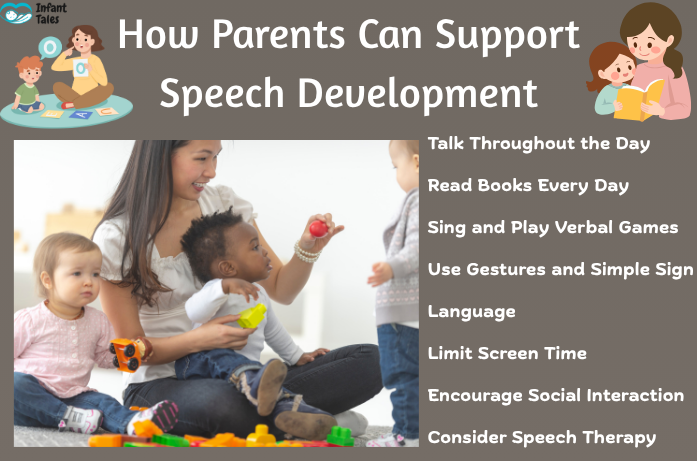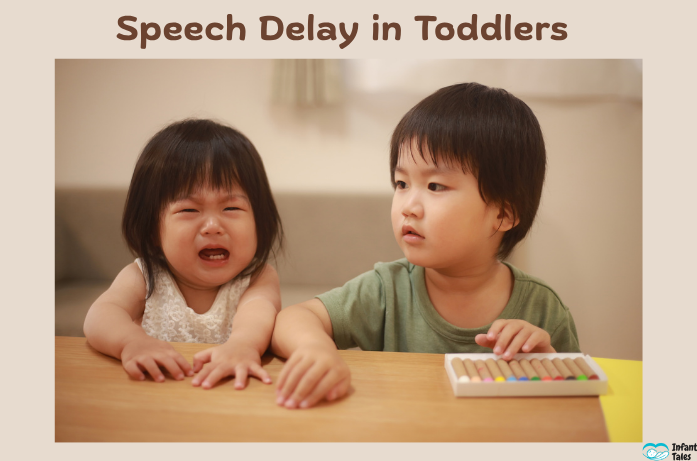By a Caring Mom at Infant Tales
When a toddler isn’t talking when the parents expect, a different mix of feelings comes into play-worry, confusion, guilt. Parents may find themselves wondering, “Is this normal?” or “Should I be doing more?” Nevertheless, speech delay in toddlers is something that very commonly affects toddlers, and most times, it can be well tackled with the right kind of encouragement and understanding of speech and language milestones.
This guide covers all that parents ever want to know, what is really meant by speech delay, major speech and language milestones that are supposed to be attained, common causes, and, most importantly, practical strategies that parents can carry out in their homes to foster their child’s communication skills. Many toddlers end up picking up speed and doing well, depending on patience, consistency, and early intervention should it become necessary.
What Is a Speech Delay?
Speech delay takes place when children fail to develop speech and language skills within the anticipated age range. Some will be late talkers, but others have the issues standing in their way.
It’s important to distinguish between speech and language:
- Speech is the physical act of talking, forming sounds and words.
- Language is the ability to understand and use words to communicate.
According to the National Institute on Deafness and Other Communication Disorders (NIDCD), children who have difficulty in one or both of these areas may be flagged as having communication disorders.
Some toddlers may have an understanding of everything that is being said but may not be able to verbally express themselves. Other children may have difficulties in both areas.
Speech Milestones: What to Look For
Every child develops at a unique rate; however, these are the general speech development milestones that may help in spotting any delays.
By 12 Months
- Does not babble or make repetitive sounds such as “ba-ba,” “da-da.”
- Does not respond to their own name or everyday sounds.
- Does not use gestures, such as pointing, waving, or reaching.
By 18 Months
- Speaks fewer than 10 clear words.
- Shows no desire to imitate or copy simple words and sounds.
- Does not follow simple directions such as “give me the ball.”
By 24 Months
- Has fewer than 50 words in his or her vocabulary.
- Is not yet combining two words, for instance, “more juice” or “go out.”
- Seldom understood even by family members.
By 36 Months
- Usually hard for strangers to understand.
- Cannot say simple sentences of three words.
- Asking very rarely or has a hard time saying what they need.
For more details on toddler communication skills and early childhood development, check the: CDC Milestone Tracker
What Causes Speech Delay in Toddlers?
The multifactorial setting of speech delay is such that many factors may contribute to the cause.
1. Hearing Problems
The most common cause of speech delay is hearing loss. If your toddler cannot hear sounds clearly, then how can he or she really imitate or learn speech? Keeping in mind, intermittent ear infections or fluid accumulation can muffle hearing almost transiently. (as noted by the National Institute on Deafness and Other Communication Disorders (NIDCD)).
2. Oral-Motor Issues
Weaknesses in muscles of the mouth, lips, or tongue can interfere with producing speech. Childhood Apraxia of speech or low muscle tone are potential hindrances in forming sounds.
3. Developmental Disorders
Speech delay can be associated with disorders in development such as:
- Autism Spectrum Disorder (ASD)
- Intellectual disabilities
- Neurological delays
Note that speech delay is just one indicator and will not act as a diagnosis by itself.
4. Environmental and Social Factors
Toddlers require rich language environments to develop communication skills. Insufficient verbal interaction, hours on screen, lack of social engagement might all slow down speech development.
5. Family History
A mix of genetics and speech delay is taken into account. If speech delay runs in your family, your child is likely to experience the same.
6. Bilingual Households
Children raised in multilingual homes seem to take a longer time to start speaking-they catch up, however, and eventually become very good at both languages.

How Parents Can Support Speech Development
As a parent, you really can change the speech and language development of your child. So, here is what you can do every day:
1. Talk Throughout the Day
Describe everything you are doing: “Now we are putting on your shoes,” or, “Let’s get your cup.” This builds vocabulary and supports speech development.
2. Read Books Every Day
Age-appropriate books with colorful pictures and repetitive language should be selected. Encourage your child to point to objects and attempt to name them. Reading opens up the vocabulary and gets verbal interaction going. Reading is one of the best activities to improve toddler speech.
3. Sing and Play Verbal Games
Songs and rhymes enable your toddler to learn rhythms, sounds, and new words. Rhymes like “Itsy Bitsy Spider” or “Row, Row, Row Your Boat” are fun and educational speech therapy activities for toddlers at home, recommended by many Speech-Language Pathologists (SLPs).
4. Use Gestures and Simple Sign Language
Use these to assist communication along with gestures and signs such as “more,” “eat,” or “help.” It can cut down on frustration if your child cannot speak yet.
5. Limit Screen Time
Passive screen time doesn’t support language development. Face-to-face interactions, conversations, and real play are far more important for promoting communication skills.
6. Encourage Social Interaction
Playdates, excursions in the park, or times reserved for book-reading sessions at the library-all present your child with the challenges of hearing and using language in diverse environments.
7. Consider Speech Therapy
If milestones are missed, early speech therapy for toddlers is very effective. Many families benefit from state-run Early Intervention Programs or ECLKC Head Start services.
When Should You Worry?
A child is an individual, and some kids just are slow to talk. Your child should definitely meet with a pediatrician if:
- They have no first word by 18 months of age
- There is no apparent progress in speech as time goes on
- Your child shows frustration with communication or behavior changes
- Your gut feeling says something is up
Know that you are the best judge of your child. Getting an early evaluation on your side will either give you peace of mind or direct you to the appropriate resources.
Emotional Impact on Parents
Watching your child struggle to communicate can be very painful at times, and depending on the situation, you are going to feel guilty, worried, or/or helpless. All of these feelings are valid, but remember: You are not alone, and the right steps can place speech delays behind you.
There is no blame, and seeking help is not a sign of failure, it’s a sign of love and strength. Many children with speech delays go on to thrive academically, socially, and emotionally.
Albert Einstein himself is said never to have spoken until he was at least four years old. Every child is an individual in their own time-and-with your support-your child will find their voice.
Final Words of Encouragement
At times speech delay in toddlers seems like a big barrier; with time, help, and early intervention, it is a mountain many children cross.
Keep talking, keep reading, and keep playing. Be patient, be observant, and celebrate every small move forward, for a slow step is still a step.
If you are actively engaged with your child and have taken every step to help them, be proud of yourself-you are doing great. Keep that thing up; you’ve got this.
FAQs
1. When should I worry about my toddler not talking?
If your child does not utter a word at 18 months, or does not use two-word phrases by the age of 2 years, consult your pediatrician.
2. Can too much screen time delay speech?
Yes, screen time can interfere with speech development because children must use the verbal medium of interaction.
3. How can I help my toddler talk more?
Talk, read, sing, and play with your child daily. Keep screen time to a minimum and rather encourage face-to-face interaction.
4. Does speech delay always mean autism?
No, speech delay can occur without autism. But if you notice other signs, consult a specialist for evaluation.
5. Is speech therapy helpful for toddlers?
Yes, early speech therapy can be very effective in improving communication skills.
Medical Disclaimer: This article serves informational purposes only and should not be taken as medical advice. Always get professional advice from your pediatrician or a licensed speech-language pathologist if there is a concern about your child’s developmental progress.
Want more gentle parenting and development tips? Explore our guides at Infant Tales for expert-backed articles on baby milestones, toddler learning, and positive parenting.



